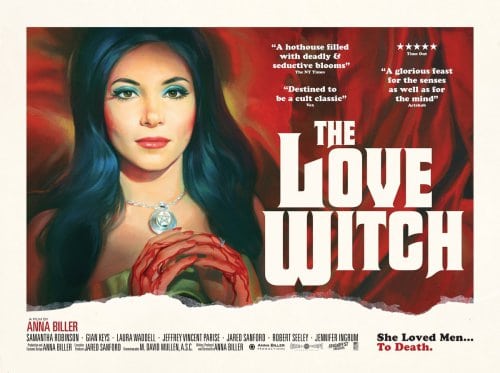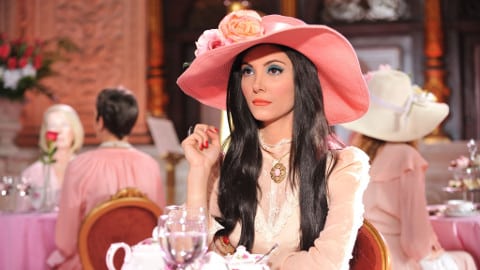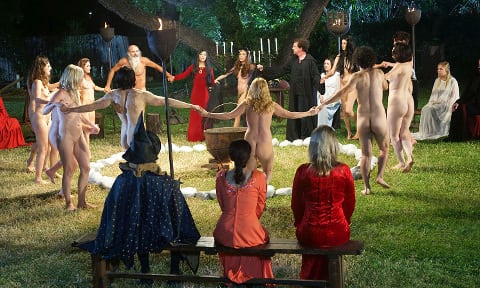The Love Witch (2016)
Directed by: Anna Biller
Written by: Anna Biller
Starring: Gian Keys, Jeffrey Vincent Parise, Laura Waddell, Samantha Robinson
USA
IN SELECTED CINEMAS, ON BLU-RAY, DVD AND AMAZON VIDEO: NOW
RUNNING TIME: 120 min
REVIEWED BY: Dr Lenera, Official HCF Critic
Elaine, a young witch, drives to Arcata, California to start a new life after the death of her husband. She rents a room in a Victorian home owned by Elaine’s mentor Barbara and kept up by its interior decorator, Trish Manning. In an attempt to befriend the young woman Trish takes Elaine to a teahouse, where she’s met by her husband Richard, who is instantly besotted with Elaine after meeting her gaze. Hoping to find a new lover, Elaine performs a ritual to find a new man and soon meets Wayne, a literature teacher at the local college, but after sex Wayne becomes emotional and clingy and dies the next day. She decides that the next man she will try to seduce will be Richard husband….
Well one thing’s for sure – The Love Witch is most definitely a feast for the eyes, and I’m not just talking about its delectable star. I haven’t seen such a striking use of colour in a very long time, the elaborate synchronising of set design and costumes approaching something like The Umbrellas Of Cherbourg in brilliance. However, I must confess that – and I’m probably in the minority here though I haven’t read any other reviews of The Love Witch in ages – the film otherwise left me somewhat frustrated, and when it didn’t do that it often just left me cold. It’s undoubtedly a labour of love by Anna Billler who not only directed, produced and wrote, but was also responsible for some of the music, and did the editing, production design, art direction, and costume design, and I tend not to feel very good criticising something like this into which its creator clearly poured her heart and soul rather than it another bland, anonymous ‘blockbuster’. I guess I expected a sort of melding of Douglas Sirk and Jess Franco, but, while there are elements of both these two very different filmmakers, there’s far less of the Euro-trash late 1960’s/early 1970’s exploitation movie feel in this film than you may well have expected. It’s there in places, especially in the interior set design and some of the music, but for the most part, it’s a heavy handed feminist tract told in a mock-1950’s melodrama style that ends up getting muddled and confused about what it’s really trying to say about the eternal battle of the sexes – unless that’s the point, which is very odd indeed. And it barely attempts to even be a horror film, while it’s also kind of tongue in cheek but hardly ever actually funny.
We are first introduced to our heroine narrating her thoughts as she drives from San Francisco to Arcata, replete with very obvious back projection that, along with Elaine’s garb, seemed to me to have a deliberate Hitchcockian feel [she’s even stopped by a cop a la Psycho], though that’s really it in terms of alluding to the Master of Suspense – for a start, there’s hardly any suspense in the movie. Anyway, Elaine arrives in Arcata and one cannot help but notice the strong use of colour already as she gets out of her bright red car and her dress, handbag and suitcase are of exactly the same bright red. She goes to have tea with the new friend Trish and the teahouse is an incredibly calming [and I don’t normally like the colour at all] paradise of different shades of pink. We find out that Elaine’s husband died – probably due to her though we’re never given actual confirmation of this – and that she died herself but was brought back to life as a witch. One of the things that – aside from the visual aspects – I did like about this film is its alternative universe where witches openly live alongside humans but – in the manner of many ethnic minorities – are distrusted by them. Elaine sets herself up in her room and immediately begins to make potions and spells. She seems to need a man right away, so she uses her wiles to get one, and gives him a drink made from “organic berries, vodka and hallucinogenic herbs” – and here we have one of the best moments of the film as he sees stick-like formations of red, green and blue all over the place before he goes to bed to bed with her, their lovemaking often obscured by coloured reflections of light.
This is all good fun, and one cannot help but get a Franco vibe here – Elaine is a bit like his Bare Breasted Countess with her desperation and her narrating of her thoughts – though actually it seems to be that the more interesting Jean Rollin was a greater influence on The Love Witch overall – but as I said earlier it seems that the Euro sleaze aspect has been overstated. After Wayne has reacted oddly to his night of sex and then actually dies, the film, which was really taking its time to start off with, soon gets rather bogged down in the police investigation and an almost never ending lines of dialogue taking pot shots at the three legged species of the nature of: “Guys cannot handle their emotions well, that’s why they don’t like conversations”. The history of cinema is filled with movies which adopt a misogynist viewpoint so there’s nothing inherently wrong with films trying to even the score a little, but I tire of lots of it in one film and I certainly tired of it in this one, especially with its cartoon-like male stereotypes. I couldn’t really understand why Elaine, in a film which makes it clear that it’s using the idea of the witch as a metaphor of men’s fears of women [and in particular their sexuality], still seems to need a man to make her complete, and why these witches are being told to give men what they want as “only then will he see you as a human being”, yet later on it seems to be suggested that this is degrading. Far more sophisticated critics with a greater knowledge of this subject no doubt get what Biller is saying, but she ended up confusing this possibly dumb yokel [though having Elaine naked quite often in the film but never – except for one fleeting moment – actually revealing her breasts is clearly intended to wind us male viewers up] who mostly just felt annoyance at another irritating example of the man bashing which is sadly trendy at the moment.
Elaine next goes for Trish’s husband Richard, but the person she genuinely falls in love with is the chief cop on her trail Griff and she doesn’t want to mix him one of her potions as they tend to reveal the more unappealing [at least to her] traits of guys she’s just slept with – though Richard shows to the viewer that he’s not really worthy of her anyway in a neat moment when we hear the thoughts of both him and Elaine, and his just aren’t very nice. The two virtually seem to go back in time when they run into a weird kind of solstice celebration/medieval re-enactment show which is one of the highlights of the film, but of course we’re on the edge of our seats as to when he’ll find out who she really is and when Trish will find her out too – actually I tell a lie because tension is almost entirely absent. Biller’s heavy emphasis on the feminist aspect tend to drown out everything else, and don’t expect any scares either, nor much in the way of good old fashioned exploitation – there’s one sex scene, lots of scenes in a strip bar [because Biller thinks stripping is empowering] and a couple of fairly mild gore scenes. There’s much time devoted to wicca rituals which do have a feeling of authenticity about them. Meanwhile the performers constantly bark out their lines as if it were 60 years ago, and actually yes the acting is often very clever, succeeding in walking a very fine line between seeming like it’s from the 1950’s but slyly sending up that style of performing too. Samantha Robinson, who looks like Edwige Fenech in some shots, does do well in giving some layers and depth to her hopelessly underwritten and inconsistent character who seems to have been designed as more of a mouthpiece than anything else – and who doesn’t even really succeed in being that very much as a great deal of what she says [and does] makes little sense.
It’s just as well then that visually the film is so magnificent – red is especially well used in a lot of scenes, while Dracula Has Risen From The Grave’s filters around the edge of the screen get an interesting reprise. Almost every shot, even the more ‘mundane’ ones, seem to have been meticulously thought through, right down to the smallest detail, while Elaine’s garb often matches her surroundings, sometimes changing into clothes to match her new location like a chameleon. It looks like this could sadly be one of the last films to be shot in 35mm and it really does showcase the format to its best advantage. As far I’m concerned film has a quality which digital just can’t match, and The Love Witch just wouldn’t look nearly as good if it hadn’t originated on film. One odd thing is that much of the interior design and décor is late 1960’s/early 1970’s, but then there are also modern cars and even a mobile phone. I guess it doesn’t really matter, it being an attempt to create a timeless feel. Meanwhile the soundtrack is largely comprised of Ennio Morricone tracks from giallos, and if you’re familiar with the pieces then they may very well stick out like a sore thumb, though I was pleased that there were a few I didn’t recognise. Tending to showcasing the Maestro’s more experimental, psychedelic sound, the music does enhance the film quite considerably.
The Love Witch most definitely has its moments, has clearly been made with total artistic integrity, and [it’s worth saying just one more time] really does look fabulous. I wanted to love it. But overall it just didn’t really come off for this critic. The constant parade of artifice often dazzles the eyes and mostly manages to be never less than appealing, but it just ends up getting in the way of whatever Biller is trying to say [which isn’t too clear in the first place, though it’s possible that the Blu-ray extras will enlighten me], while whatever she’s trying to say takes over everything else too much, and as a result the film only really comes to life in scattered moments. And it’s a rather sad sign of the times that its attitude to men seems to be largely accepted and even praised, but if it were the other way around then there would probably be an uproar. Take 20 minutes or so out of it, and I have a feeling that it would be improved somewhat, but in the form it’s in now, The Love Witch only sometimes managed to seduce me, and had me under its spell even less often.







Be the first to comment